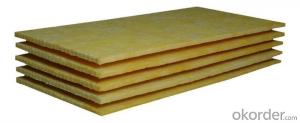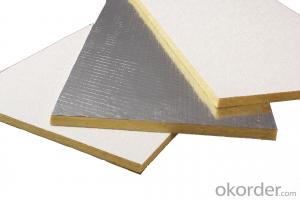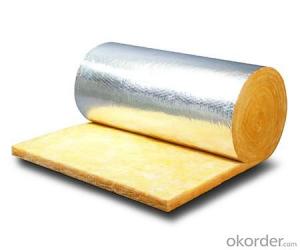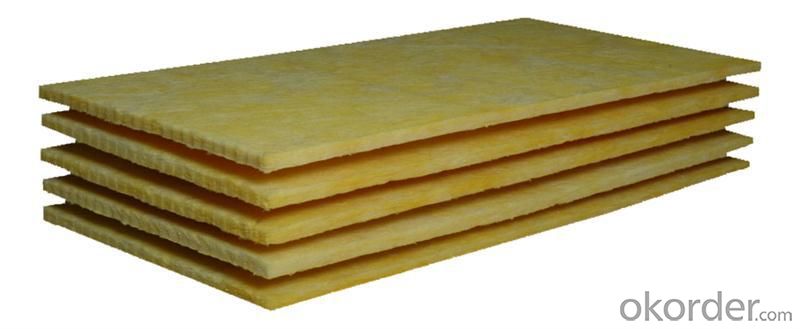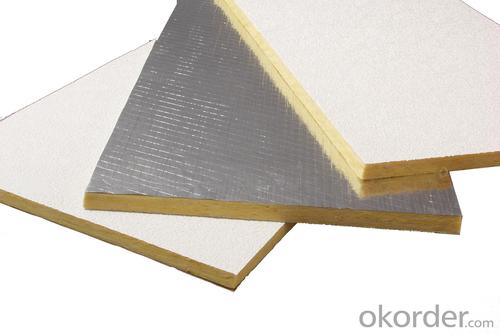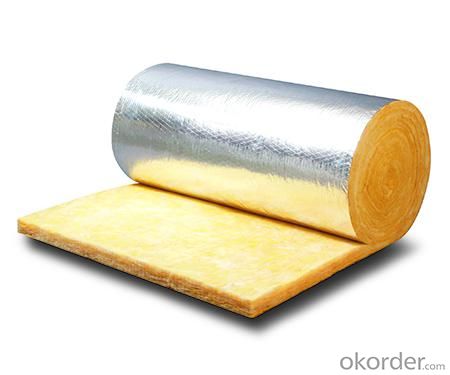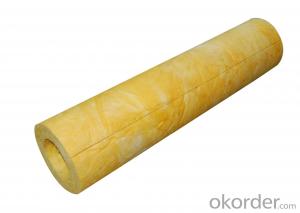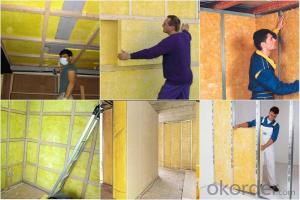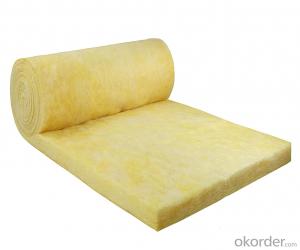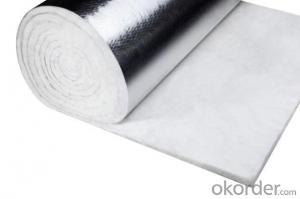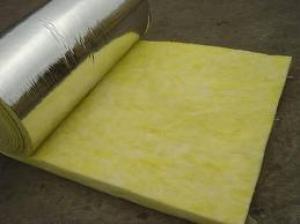Fiberglass Mat Tissue Glass Wool Insulation Batt Materials
- Loading Port:
- Tianjin
- Payment Terms:
- TT OR LC
- Min Order Qty:
- 5000 m²
- Supply Capability:
- 20000 m²/month
OKorder Service Pledge
OKorder Financial Service
You Might Also Like
1.Description of Glass Wool Blanket:
Glass wool, which belongs to glass fiber , is a kind of man-made inorganic fiber. It is made from fibrosis glass melt in wool shape, which belongs to inorganic fiber and fiber in its chemical ingredient. Its merit is better in shape, low density and volume, low in thermal conduction, better heat preservation and thermal insulation, fine sound absorption, corrosion-resistant and stable chemical property. Glass wool blanket, glass wool board, glass wool pipe, which made from glass wool, largely use in construction, chemical, electronic, electricity, metallurgy, energy industry and community with good performance in heat preservation, heat insulation, sound absorption.
2.Main features of Glass Wool Blanket:
a) : fire-resistance
It belongs to upmost fire resistance grade, Class A. It totally meet fire proofing requirement of national standard. It can guarantee the safety of building.
b): heat perversion property
Glass fiber, whose even fiber distribution and reedy fiber lead to lower coefficient of heat conductivity, can ensure its excellent heat-insulating property and long-term heat-preservation.
c): Environmental protection property
Glass wool, which is made from achromatism plate glass and quartz sand, is inorganic heat preservation material. It is a kind of green building material. What’s more, the scrap can be recycled and be reused. It can meet requirement of environmental protection.
3.Glass Wool Blanket Images:
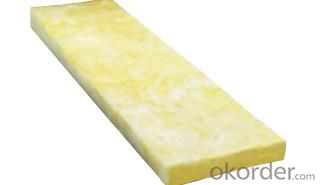
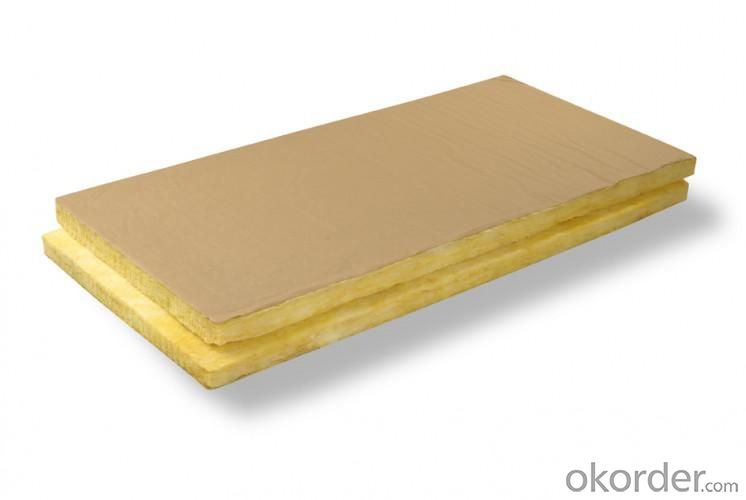
4. Glass Wool Insulation Blanket Technical Parameters:
Property | High/low temperature resistance, oil and fuel resistance, weathering resistance, O zone resistance etc. |
Shape | According to your requirement. |
Color | Any color is available ,according to your requirements. |
Material | NBR, CR, SBR, EPDM, IIR, NR, EP, Silicone, VITON etc. |
Hardness | 30-90ShoreA |
Delivery | In 10 days |
Packing | Plastic bag & carton box or according to your requirements. |
Application | Electronic field, industrial machine & equipment, house-hold appliance, telecommunication, automobile, medical equipment industry etc. |
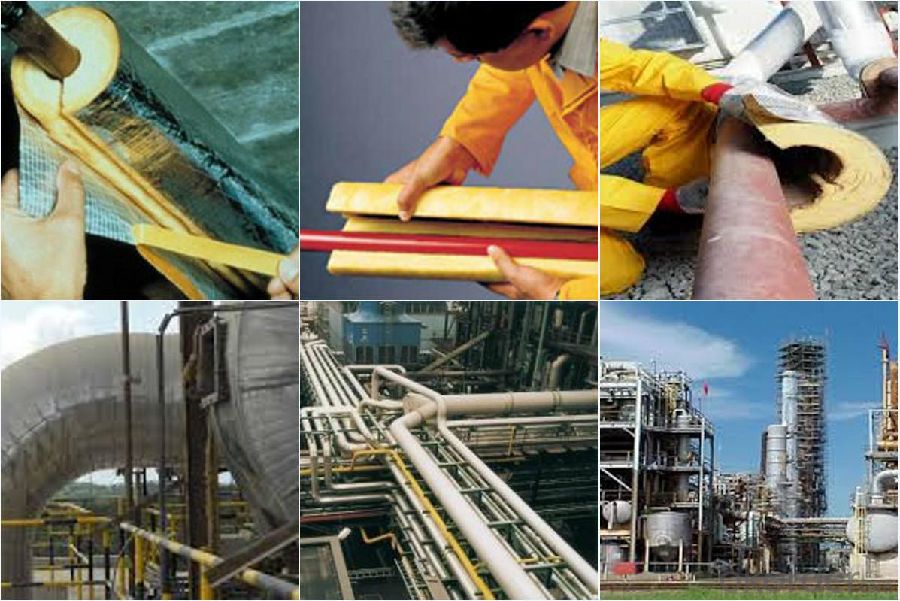
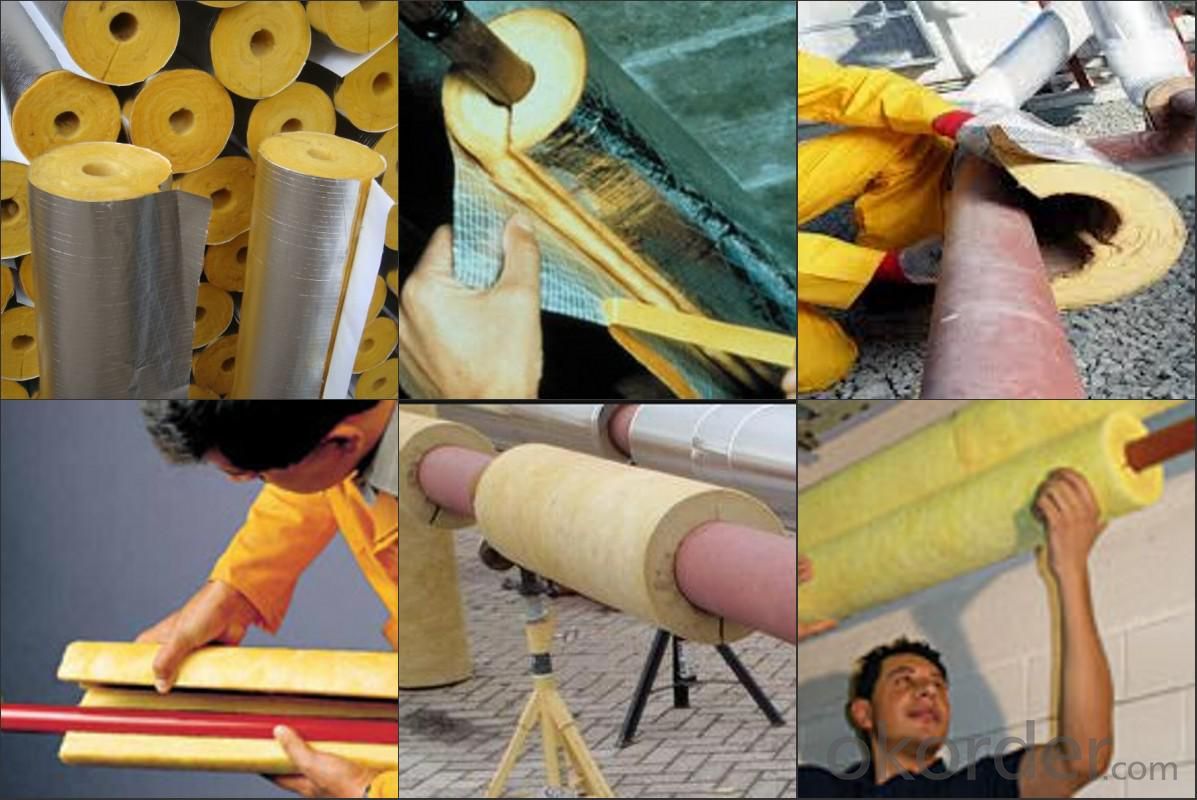
5.FAQ
We have organized several common questions for our clients,may help you sincerely:
①How about your company?
A world class manufacturer & supplier of Glass Wool Blanket is one of the large scale professional investment casting production bases in China,consisting of both casting foundry forging and machining factory. Annually more than 8000 tons Precision casting and forging parts are exported to markets in Europe,America and Japan. OEM casting and forging service available according to customer’s requirement.
②How to guarantee the quality of the products?
We have established the international advanced quality management system every link from raw material to final product we have strict quality test; We resolutely put an end to unqualified products flowing into the market. At the same time, we will provide necessary follow-up service assurance.
- Q: What are the different fabric finishes available for fiberglass mat tissue?
- Some of the different fabric finishes available for fiberglass mat tissue include plain weave, twill weave, satin weave, and leno weave. These finishes affect the appearance and texture of the tissue, as well as its strength and durability.
- Q: Can fiberglass mat tissue be used for insulating concrete forms (ICFs)?
- Yes, fiberglass mat tissue can be used for insulating concrete forms (ICFs). It is commonly used as a reinforcement material in ICF construction due to its excellent insulation properties and ability to improve the overall strength and durability of the concrete structure.
- Q: Is fiberglass mat tissue resistant to mold growth?
- Yes, fiberglass mat tissue is resistant to mold growth. Fiberglass is made from glass fibers that are tightly woven together, creating a material that is highly resistant to moisture and mold. Additionally, fiberglass is non-porous, meaning it does not absorb water, which further inhibits the growth of mold. This makes fiberglass mat tissue an ideal choice for applications where mold resistance is important, such as in insulation, wallboards, and other construction materials.
- Q: Can fiberglass mat tissue be used for swimming pool construction?
- Yes, fiberglass mat tissue can be used for swimming pool construction. It is commonly used as a reinforcement material to provide strength and durability to the pool structure.
- Q: Can fiberglass mat tissue be used for composite tooling?
- Yes, fiberglass mat tissue can be used for composite tooling. Fiberglass mat tissue is a lightweight material made of randomly oriented fiberglass strands bonded together with a resin binder. It is commonly used as a reinforcement material in composite applications such as boat building, automotive parts, and aerospace structures. When used for composite tooling, fiberglass mat tissue can provide strength and stiffness to the tooling structure. It can be layered and impregnated with resin to form a solid and durable composite tool. The resin binder in the mat tissue helps to hold the fibers together and provide resistance against wear and tear. Fiberglass mat tissue is also flexible and can be easily molded into complex shapes, making it suitable for creating tooling with intricate designs. It can be easily cut and shaped to match the desired tooling dimensions. However, it is important to note that fiberglass mat tissue alone may not be sufficient for all types of tooling applications. Depending on the specific requirements of the tool, additional reinforcement materials such as carbon fiber or Kevlar may need to be added to enhance the strength and durability. Overall, fiberglass mat tissue can be a cost-effective and practical choice for composite tooling, providing strength, flexibility, and ease of use.
- Q: Can fiberglass mat tissue be used for repairing damaged fiberglass structures?
- Yes, fiberglass mat tissue can be used for repairing damaged fiberglass structures. The mat tissue is designed to provide strength and reinforcement to the damaged area, making it an effective solution for repairing fiberglass structures.
- Q: Can fiberglass mat tissue be used for repairing fiberglass fenders?
- Yes, fiberglass mat tissue can be used for repairing fiberglass fenders. Fiberglass mat tissue is a versatile material that is commonly used in fiberglass repair work. It is often used as a reinforcement layer to add strength and durability to the repaired area. When repairing fiberglass fenders, the damaged or cracked area can be repaired by applying a layer of resin and then laying the fiberglass mat tissue over it. The mat tissue is then saturated with additional resin to create a strong bond and ensure a smooth finish. This process helps to restore the structural integrity of the fender and provide a seamless repair. However, it is important to note that the success of the repair depends on the extent of the damage and the skill of the person performing the repair.
- Q: What is the weight of fiberglass mat tissue per square meter?
- The weight per square meter of fiberglass mat tissue may differ based on the particular product and manufacturer. Typically, the weight of fiberglass mat tissues can range from 100 grams per square meter (gsm) to 900 gsm. Nevertheless, it should be noted that in certain instances, the weight may also be expressed in ounces per square yard (oz/yd²). To ascertain the precise weight of a particular fiberglass mat tissue, it is advisable to consult the manufacturer's provided product specifications.
- Q: How does fiberglass mat tissue compare to cellulose insulation?
- Fiberglass mat tissue and cellulose insulation differ in terms of material composition and insulation properties. Fiberglass mat tissue is made from fine glass fibers, while cellulose insulation is composed of recycled paper fibers treated with fire-retardant chemicals. Fiberglass mat tissue offers higher R-value, meaning it provides better thermal insulation and energy efficiency. Additionally, it is resistant to moisture and does not promote mold growth. On the other hand, cellulose insulation is more affordable, environmentally friendly, and provides better sound insulation. Ultimately, the choice between the two depends on specific insulation needs, budget, and environmental considerations.
- Q: Can fiberglass mat tissue be used for making decorative panels?
- Yes, fiberglass mat tissue can be used for making decorative panels. Fiberglass mat tissue is a versatile material that is commonly used in the construction and manufacturing industries. It is made up of randomly oriented glass fibers that are bonded together with a binder. This combination of fiberglass and binder creates a strong and durable material that is suitable for a wide range of applications. When it comes to decorative panels, fiberglass mat tissue can be an excellent choice. It can be molded into various shapes and sizes, allowing for the creation of intricate and unique designs. The material is also lightweight, making it easy to handle and install. Additionally, fiberglass mat tissue has excellent dimensional stability, meaning that it will not warp or deform over time. Furthermore, fiberglass mat tissue is highly resistant to moisture, chemicals, and UV radiation, making it ideal for both indoor and outdoor applications. It can withstand harsh weather conditions and is not susceptible to rot or decay. This durability ensures that decorative panels made from fiberglass mat tissue will maintain their appearance and functionality for an extended period. In terms of finishing, fiberglass mat tissue can be easily painted or coated to achieve the desired aesthetic. It can also be laminated with other materials, such as wood veneer or decorative films, to enhance its visual appeal. This flexibility allows for endless design possibilities, making fiberglass mat tissue an excellent choice for creating decorative panels. In summary, fiberglass mat tissue is a suitable material for making decorative panels. Its strength, durability, and versatility make it a reliable choice for both indoor and outdoor applications. Whether you are looking to create unique designs or enhance the aesthetics of a space, fiberglass mat tissue can provide the necessary qualities to achieve your desired outcome.
Send your message to us
Fiberglass Mat Tissue Glass Wool Insulation Batt Materials
- Loading Port:
- Tianjin
- Payment Terms:
- TT OR LC
- Min Order Qty:
- 5000 m²
- Supply Capability:
- 20000 m²/month
OKorder Service Pledge
OKorder Financial Service
Similar products
Hot products
Hot Searches
Related keywords
